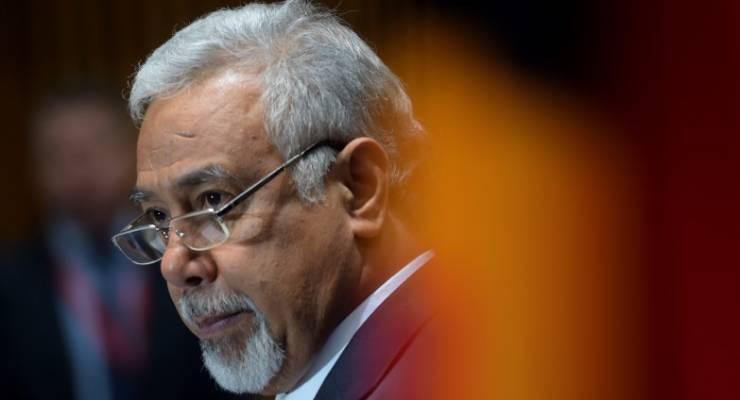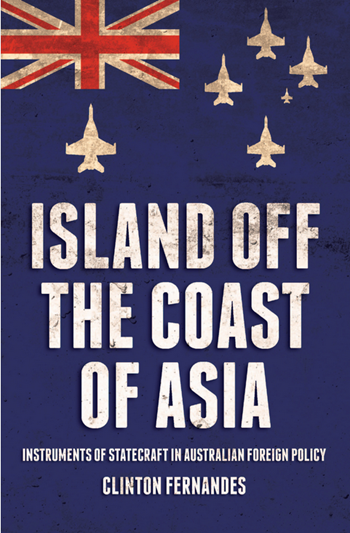
Former president of Timor-Leste Xanana Gusmão
The illegal bugging of the Timor-Leste cabinet by the Australian Secret Intelligence Service (ASIS) in 2004, and the efforts of subsequent governments to cover it up, are only a part of the long history of Australia’s foreign policy being used for the commercial benefit of resource companies, a new book demonstrates.
University of NSW professor and former army intelligence officer Clinton Fernandes’ new book Island Off The Coast Of Asia details the centrality of commercial interests to Australian foreign policy throughout its history, and the instruments that have been used to ensure the interests of Australian companies, and those of our allies, have been protected at all costs.

Fernandes singles out the Law of the Sea Convention (LOSC) of 1982 as “one of the most important projects ever undertaken by the Department of Foreign Affairs and Trade or its predecessors”, which illustrated how “the public bears the costs and risks of diplomacy, law, investment, research, negotiations, espionage, and other instruments of statecraft, while small groups in control of vast concentrations of capital benefit disproportionately”.
The LOSC determined the extent of exclusive economic zones around the coastline of countries, which they alone can exploit; Fernandes explains the complex research Australia needed to back its claims, but there was more than mere survey work: the Hawke government also undertook a mammoth seismic survey project to establish the petroleum exploration potential of its offshore areas for corporations to exploit. That is, taxpayers funded the basic — and very expensive — research to establish the offshore petroleum potential of Australia’s economic zone, which cabinet was told petroleum companies would refuse to fund themselves.
Fernandes shows how Treasury and Finance objected to this taxpayer largesse for resource companies. “Market failure in the petroleum exploration industry has not been demonstrated,” Treasury told cabinet. “… [I]ncreased industry participation in the program is warranted, and this would be best achieved by a much more substantial level of cost recovery.”
A highly concentrated resources sector would enjoy “significant benefits,” Finance said. But the Hawke cabinet dismissed their concerns, preferring to pay for exploration that resource companies should have been undertaking themselves.
A key beneficiary of the research was Australian company Woodside, which used the North West Shelf and other offshore gas projects to become one of Australia’s biggest companies and a national champion to be protected against foreign takeover. It was also Woodside that had discovered oil and gas reserves in the Greater Sunrise field in the 1970s, in the middle of decades of arguments between Australia, Indonesia and Portugal over maritime borders and access to the resources beneath them. That issue was crucial to shaping Australia’s relations with Indonesia and its attitude to Indonesia’s occupation of Timor-Leste. Woodside was a key beneficiary of the Timor Gap Treaty negotiated by Gareth Evans with Indonesia in 1989 to enable joint exploitation of the “gap” in the border left by Portugal’s previous control of Timor-Leste, with both countries issuing production licences to Woodside in the 1990s.
Woodside’s interests thus had to be protected after Timor-Leste’s independence from Indonesia voided the treaty. The Howard government blackmailed the newly established state into signing the Timor Sea Treaty in 2002 and then demanded it sign an International Unitisation Agreement in 2003 to determine the split of the Greater Sunrise gas fields. In 2002, Alexander Downer told Xanana Gusmão that Australia was happy to leave the resources unexploited for decades if Australia wasn’t allowed to get its way for Woodside, which led the consortium of companies that would exploit the resources. “They can stay there for 20, 40, 50 years. We are very tough. We will not care if you give information to the media. Let me give you a tutorial in politics — not a chance.”
To give Australia extra leverage in negotiations, Downer asked ASIS to bug the Timor-Leste cabinet, under the cover of an aid project, redirecting ASIS resources from the counter-terror fight in Indonesia (ASIS had previously been able to obtain the documents of Indonesian Timor Gap Treaty negotiators in the 1980s, so Downer’s order was another demonstration of bipartisan continuity). Downer was also unapologetic about running Australian foreign policy for the benefit of Woodside. “Woodside is an Australian company … These are people who have paid good money for leases, they have an interest in the legal and regulatory regime , and obviously Australia would conduct negotiations cognizant of the implications of what they were doing.”
Woodside’s relations with government officials continued beyond diplomacy. Fernandes notes two of Woodside’s senior staff in Timor-Leste in recent years have been former DFAT officials. DFAT secretary Ashton Calvert joined the Woodside board after leaving the public service. Downer himself would take a consulting role with Woodside. And another Woodside executive, Gary Gray, would become Labor’s resources minister.
And in 2013, it was a Labor government that lashed out at Gusmão over the Timor Sea Treaty and, after the revelation of the bugging by ASIS, it would be Labor attorney-general Mark Dreyfus who approved the bugging of Witness K’s, and Timor-Leste’s, lawyer Bernard Collaery. As Fernandes constantly demonstrates, bipartisan continuity has been at the heart of the dominance of commercial interests in Australia’s regional foreign policy.








Isn’t it good to know that we have bipartisan policy in the face of aggressive threats like Timor-Leste? (Sarcasm off) What a disgrace. Can we blame anyone but ourselves if Timor-Leste turns to major powers in Asia for help with development, perhaps in return for providing them with a port for their navy and an airstrip for their aircraft? Really Australia? The true argument is a moral one but I know that won’t wash with our establishment so let’s point out the security argument.
Yet again our two major parties are shown to be bereft of any moral values.
also birdbrain they are quite happy to let the average taxpayer pay for their distorted form of political engagement (or disengagement) …it’s about time they were shown for what they are & the fact they can be bought by the likes of Woodside, in the name of improving Australian commercial interests…
They feather their own nests by ensuring post politics rewards, power and employment, and ever have done, but it seems more blatant today. This is Timor-Leste farago is an excercise that Australia should be terribly embarrassed about. Both of the two major parties are implicated to varying degrees, but they put aside the sham of differences to pull together to protect … what? It can’t be a reputation as fair minded people. See the sandpaper in the Y fronts of our elite sportsmen. It can’t be the generosity of our spirits. See our treatment of people recognised as refugees that we have incarcerated on Nauru. It can’t be our concern for the future of the world; our level of poisoning the atmosphere is higher now that it was when the mad monk signed the Paris agreement.The rot that is being bought to light in Royal Commissions into the banks , the churches and the aged care industry is symptomatic of daily life in modern Australia, and I don’t doubt, the rest of the world.
Yes Peter thats the sad state of the Australia we live in today, (and you noted the world in general) people are struggling with this lack of care, the general selfishness, & shameless arrogance from those in power…it’s something that seemed much more apparent from the start of the Howard era..but this problem for Timor/Leste has obviously been going on for a lot longer…my impression of Downer has changed, I used to think of him as a milk sop…now I see him as a piece of pond scum or old over chewed gum that is stuck on Australia’s shoe for whatever reason the current can’t/won’t shake him off…
I would love to be a fly on the wall in the boardrooms of some of these multinational resource companies . They must think that Australia is the softest touch when it comes to extraction of minerals and gas resources from Australian territory. In almost all cases history shows that agreements are one sided ,loaded in favour of the multinationals. It is no wonder that a large number of politicians on both side of politics have skipped off into the sunset with cushy extremely well paying sinecures with multinational companies that they have assisted during their time in office.
That m.o. seems all so primitive now?
Now “we” complain when China, Russia or anyone else “not acceptable” hack our industries….. what would those regimes do with their “whistle-blowers”, telling us what they were doing?